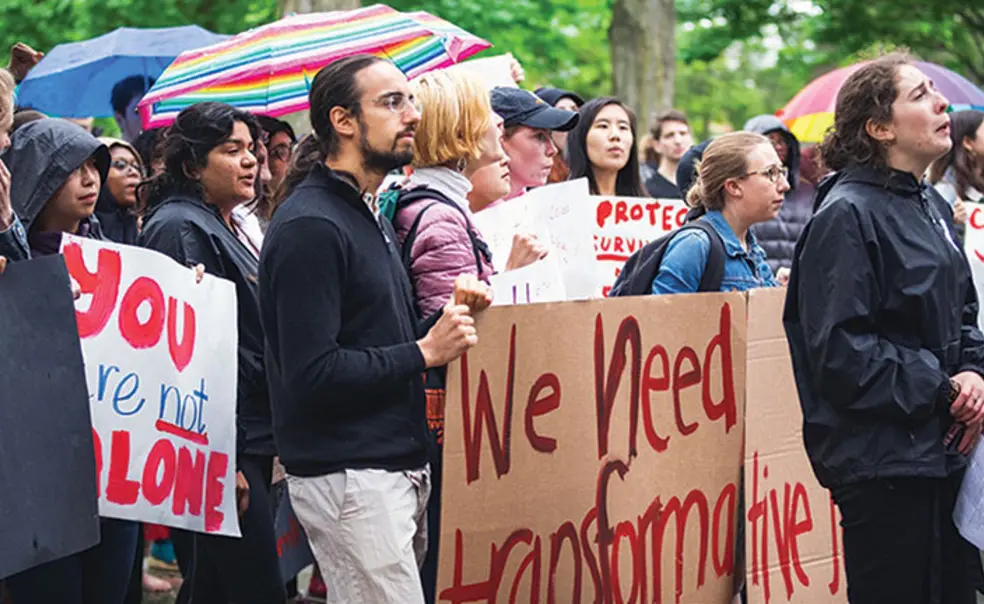University Completes Reviews of Sexual-Misconduct Policies and Procedures
Internal, external committees identified areas in which Princeton “could and should do more,” Provost Deborah Prentice says
The University has released a pair of reports on reforming Princeton’s procedures for handling sexual-misconduct cases, the target of student protests in the spring. Provost Deborah Prentice said recommendations for action in key areas should be proposed by the end of December.
“Our shared goal is to ensure that Princeton remains a safe and welcoming place where all of our community members can thrive,” Prentice said in an Oct. 24 letter to the University community. “Meeting that commitment requires us to make improvements when and where we can, and to learn from our past practices and the best practices of others.”
One report was completed by an external committee made up of Title IX experts from three other universities. The other was completed by an internal committee composed of members of the University Student Life Committee and the Faculty-Student Committee on Sexual Misconduct.
Prentice said the University would focus on four areas where both groups agreed Princeton “could and should do more.” They are: enhancing the resources offered to students involved in sexual-misconduct cases; changing the investigation, adjudication, and appeal processes of Title IX cases; expanding training and communications to create “a more positive campus climate and culture around issues of sexual misconduct”; and exploring alternative procedures and practices for resolving cases outside Title IX procedures.
The external team was charged with independently reviewing Princeton’s practices and procedures. Its report found that “the University has highly trained investigators and advisers, and a process that ensures that penalties are consistent and not arbitrary; and students are able to obtain accommodations and interim measures fairly easily.”
At the same time, the review team said it learned that “despite the objective strengths of Princeton’s Title IX infrastructure, some students feel that their needs are not being met.”
The external team challenged the University to “commit to continuous improvement — assessment as well as action — and continuous engagement at all levels.”
The internal review group met throughout the summer. Among the group’s 19 recommendations are the following:
- Restructure the Title IX office to allow the director to focus on oversight without being required to serve on investigative panels.
- Provide more training to discourage retaliation and provide examples of prohibited retaliatory conduct in University policies as ways to address a concern that fear of retaliation deters many people from seeking assistance.
- Expand assistance for students to navigate Title IX investigations and appeals.
- Streamline the procedures to apply for student mental-health funding, and determine if funds are adequate.
- Provide more alternatives to the full disciplinary process and study examples of paths for restorative justice, defined as “a non-adversarial approach to addressing offensive behavior that seeks to identify and repair harm and rebuild trust through facilitated dialogue.”
The internal committee recommended establishing a Restorative Practices Working Group to research approaches to the “creation of safe spaces, building trust, attending to trauma and resilience, and setting community standards and norms.” The committee noted that non-disciplinary options, including informal mediation, are available through the University’s ombuds office. The report said it is unclear whether restorative justice is permissible under federal Title IX regulations.
Restorative justice was one of the original demands brought forth by the student group Princeton IX Now. Following the University’s disciplinary action against a student who wrote “Title IX protects rapists” on campus walkways, students conducted a nine-day sit-in in front of Nassau Hall in May and additional protests at Reunions, where many alumni showed solidarity by wearing touches of purple. Members of Princeton IX Now said they would not have a response to the release of the reports until after fall break.
Both reports pointed out that the U.S. Department of Education’s Office for Civil Rights may change its Title IX policies this fall, and that this could affect the University’s policies and procedures.
Prentice promised “many opportunities” to discuss the reports, starting with the Nov. 11 meeting of the Council of the Princeton University Community (CPUC).
Read more: The full reports can be found at http://bit.ly/TitleIXreports.












1 Response
Norman Ravitch *62
6 Years AgoA Utopian Scheme
As long as men are men and women are women, there will be sexual misconduct in every area of life. Trying to end this is utopian, like trying to end poverty. Utopian schemes sound good until they are tried, and end up making things not better but worse.